“What about ambulances?” a friend who is visiting from New York asked recently as I was excitedly telling her about our bike community and recent car-free activism. I had no idea what she was referring to.
“And what about handicapped people?” she added by way of explanation. I was still confused. “Well, if you ban cars, not everybody can ride bicycles all the time!” she finally said.
Aha!
This is a pretty common narrative, actually, in some form or other, part of the cultural divide between the Portland bubble and what sometimes seems like the rest of the world.
Any reference to bicycle activism seems to conjure up images of Critical Mass and pierced messengers, and ideas of militant, my way or the highway (so-to-speak) activism that is far too common. As if to intentionally choose bike riding is to automatically reject all other options.
I have developed a few stock responses.
There’s the super-diplomatic version, like for my boyfriend’s republican parents: We want people to have choices, and we want the most attractive choices to be something other than private cars.
Or there’s the shock-and-awe response (kudos to my friend Anna): Actually, I don’t really care about bikes. I love to ride, and bikes are currently necessary as an alternative way to get around cities designed for cars. But the most revolutionary thing is to redesign neighborhoods so that you can walk—or take transit—everywhere you need to go. Walking isn’t an alternative to anything,it’s a means and an end in itself.
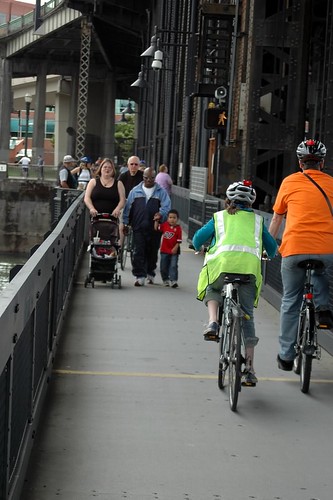
It’s kind of distressing to encounter these assumptions. The thing that really disturbs me, though, is how easy it is for bike activists to slip into making this exact sort of dictatorial demands that people expect from us. We need to step back and see that it’s about more than just the bikes.
It’s not even just about transportation, but about public space, health, safety, thriving communities, social equality, and…well you get the idea.
Bicycling is one mode, and a powerful one. But it’s just one of several, and it’s not even necessarily the ideal. We need to reach out to people who rely on the bus, who rely on their feet, who maybe can’t even afford a bike much less a car, and turn some of the amazing energy of Portland’s bicycling community into a broader vision of a city where everyone can get where they’re going.



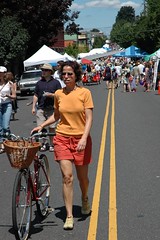
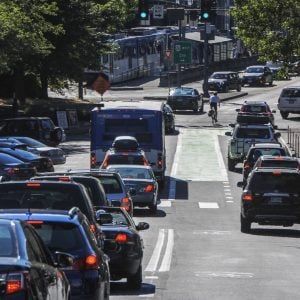
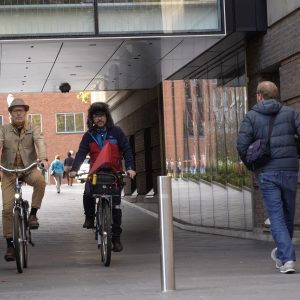
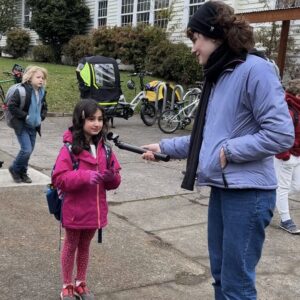
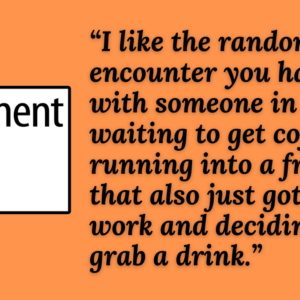
Thanks for reading.
BikePortland has served this community with independent community journalism since 2005. We rely on subscriptions from readers like you to survive. Your financial support is vital in keeping this valuable resource alive and well.
Please subscribe today to strengthen and expand our work.
WOW!
Bravo, and thank you.
If you have projects I will pledge time, energy, money, etc.
Especially if it exposes “An Inconvenient Truth”
Great point. I think the point of view that folks need to embrace is thinking of roads and passageways as “our space” vs. “my space.” It changes your whole perspective. Before, I often thought of my piece of the bike lane as mine, and no car or pedestrian should come near it. If there was debris or something in the bike lane, I’d swerve into the car lane thinking cars should make way for my clean path. But did that car going by cause the debris in the bike lane? Of course not. If you realize that everyone on the road are just *people* trying to get somewhere, you start changing the way you act….
Re: your caption for photo #1. A more accurate statement is: “This is what a healthy *street fair* looks like.” That photo shows a street that looks as if it’s been closed down to thru-traffic for a farmer’s market or something like that. It’s no longer a viable “roadway,” meaning a safe & efficient way to travel by bicycle. sure, you could stop, get off your bike, and walk thru the street fair to the other side, get back on your bike and continue riding, but that’s not necessarily what bike commuters are looking to do all the time.
If you were trying to get somewhere else in the city by bike (other than the street fair), this would definitely not be the “healthy” choice of bike routes. (Too crowded for safe riding.)
Bikers and disabled people are natural allies, not opponents. I live with a full time wheelchair user who can’t drive anymore, and the major reason we moved to Portland was that its compact growth and abundant accessible public transit alternatives made it so much easier for her to get around independently.
No one’s really talking about banning cars; even in Copenhagen, disabled-sticker and emergency vehicles get to use otherwise bike-only routes. It’s really all about choices. As Vancouver has learned, providing people with various ways of getting around usually results in less driving and more biking, public transport and especially walking. Bikes are an important part of the big picture: ending the car monopoly (imposed through bad transportation and growth planning) so that we (including those who can’t drive) can have choices.
I think we should start speaking of walking, cycling and transit as transportation, and make automobiles “alternative” (ie. outside the norm).
It’s a semantic thing, but could go a long way.
In response to the question, “What about handicapped people?” the same should be asked about streets designed only for cars.
I have a friend who had a debilitating stroke a few years ago. One side of his body is all but paralyzed — his right leg just barely works well enough to allow him to get around the house (very slooooowly). His driver’s license has been cancelled due to his physical impairments.
His only form of independent transportation is now his recumbent tricyle. He uses it to get to the grocery store; pick up his son from school on the days when his wife is at work; and generally get around the neighborhood. Thanks to Portland’s bike-friendly design, my (handicapped) friend has mobility. If this were a car-centric town, he’d be stuck at home until someone drove him somewhere. What a depressing thought. I’ve also witnessed a number of wheelchair users who have benefitted greatly from bike lanes when curb ramps or sidewalks are absent.
There are many people who are physically unable to drive a car, but who are perfectly capable of wheeling a chair, bike, or trike. Streets that make space for all vehicles and do not discriminate against certain users are important for both the physical and mental well-being of all members of our community.
A couple of key ideas that are running through my head the last few months:
1. Public planners need to face the notion that anything they do to make automobiles more attractive will necessarily make other modes of transportation _less_ attractive. Accomodating demands for more roads, wider roads, and faster roads works _discourages_ people from using alternate forms of transportation.
2. “Faster” is not better. The fastest vehicles use more fossil fuels and create more pollution. Faster vehicles cause more accidents, and create more serious injuries. We all want fast emergency vehicles, but if you aren’t driving an ambulance, your desire for high speeds is immoral and selfish.
I haven’t seen this mentioned yet: a group of us have been discussing “car-free” street options such as regular street closures, pedestrian mall streets, and partial closures of streets (such as eliminating parking on one side of NE Alberta for the Last Thursday events). We’ve taken up the old “Portland Car Free Day” email list, and had our first meeting in a street w/ a couch, pillows, and table tennis table. If you’re interested in furthering the concept of pedestrian / bike friendly streets, this mail list is a good place to get started:
http://lists.riseup.net/www/info/portlandcarfreeday
Interesting websites for inspiration:
http://www.carfree.com/
http://www.worldcarfree.net/